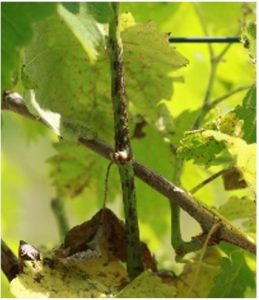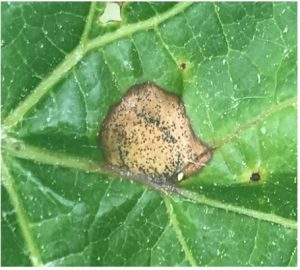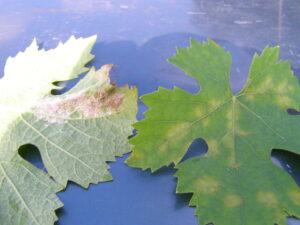Peach:
Oriental Fruit Moth: A biofix point for OFM was set on 4/11 in southern counties, and on 4/14 in northern counties. The second generation timings are updated below.
| Insecticide Type | |||
| County/Region | Degree Days by 6/8 base 45 | Conventional
1150-1200 1450-1500 |
Diamide
1075-1150 1375-1450 |
| Gloucester – Southern | 1281 | 1st –6/14-6/16
2nd –6/27-6/28 |
1st –6/12-6/15
2nd –6/24-6/27 |
| Middlesex – Northern | 1201 | 1st –6/18-6/21
2nd –6/30-6/31 |
1st –6/15-6/18
2nd –6/29-6/30 |
Tarnished Plant Bugs; and Other Catfacing Insects: Catfacing insect activity is increasing with the arrival of hot weather and is present at moderate to high levels in some orchards. Brown Marmorated Stink bugs are present at low to moderate levels in orchards statewide.
Lesser Peach Tree Borer and Peach Tree Borer: Lesser Borer adults are flying in all growing regions. Greater Peach tree borers are now flying in southern counties.
Apples and Pears:
Diseases: Fire blight and Scab are present at low levels in a few orchards. Fire Blight is increasing. It should be cut out using the ugly stub method. Potato leafhoppers can spread it so they should not be tolerated. Summer scab, rots and sooty blotch and fly speck are the main targets at this stage. Where scab is present rely primarily on protectant fungicides. Last year Captan plus a phosphorous acid like Prophyt was observed to slow scab development as well as provide good summer disease control.
Codling Moth (CM): The Second CM flight will be starting soon. If trap captures are above 5 moths/trap continue using effective materials. A biofix was set for CM on April 25th in southern counties, and May 6 in Northern counties (Middlesex County). estimated timings for the second generation are updated below.
| Codling Moth Degree Day Timing | ||||||
| Application and Insecticide Type | ||||||
| County Area | Biofix | Intrepid; Diamides – Altacor, Voliam mixes:
1150-1200 + 1450-1500 DD
|
Cyd-X, Madex
1250 DD + every 7-9 days during brood hatch (later if first spray is an IGR) |
Standard Insecticides – Delegate, Avaunt, OP’s, carbamates, pyrethroids
1250 DD + 1550-1600 DD
|
||
| DD | 1150-1200 | 1450-1500 | 1250 | 1250 | 1550-1600 | |
| Southern | April 25 | 7/3-7/5 | too far off | 7/7 | 7/7 | too far off |
| Northern | May 6 | 7/5-7/7 | too far off | 7/9 | 7/9 | too far off |
Grapes:
Diseases: Grape diseases active at this growth stage are phomopsis, powdery mildew, downy mildew, ripe rot, and black rot.
Phomopsis and downy mildew symptoms are present in southern counties. Black rot symptoms have not yet been observed but should appear any time now. Disease infection periods can be monitored using the NEWA models. Choose the weather station closest to your vineyard.
Insects: Leafhoppers have been seen in a few spots. This complex is generally not of concern. Potato leafhoppers, which arrive sometime in June, can cause some minor damage. Spotted Lantern Fly nymphs are present in high numbers on many vineyards. These nymphs do little damage and generally don’t need special treatments when present. Even so, vineyards should be monitored for SLF presence and if they are found use an insecticide effective for SLF when treating for Grape Berry Moth. More information for SLF can be found at the Penn State SLF website.
Grape Berry Moth (GBM): The biofix in southern counties for GBM was 5/25. Model timing will predict IGR and diamide materials for the second generation. The first generation is not really important in cultivated grapes. Timing for the second generation treatments using Diamides or Intrepid is set at 810 degree days base 470F. Other materials may be applied a few days later. Given the current weather patterns, this should be about the late June/early July in southern counties. Insecticides that will control both GBM and SLF include pyrethroids and premixes such as Leverage and Voliam Flexi. Voliam Flexi is a diamide premix and should be applied at the 810 degree day timing.
Tree Fruit Trap Counts – Southern Counties
| Weekending | STLM | TABM-A | CM | BMSB | OFM-A | DWB | OFM-P | TABM-P | LPTB | PTB |
| 4/9/2022 | 2 | 0 | 0 | |||||||
| 4/16/2022 | 0 | 2 | 3 | |||||||
| 4/23/2022 | 11 | 0 | 0 | 28 | 5 | 0 | 0 | |||
| 4/30/2022 | 5 | 0 | 1 | 31 | 4 | 0 | 0 | |||
| 5/7/2022 | 5 | 1 | 3 | 50 | 4 | 0 | 0 | |||
| 5/14/2022 | 8 | 5 | 3 | 19 | 2 | 0 | 0 | |||
| 5/21/2022 | 3 | 5 | 5 | 20 | 2 | 7 | 3 | |||
| 5/28/2022 | 0 | 19 | 3 | 13 | 0 | 11 | 36 | |||
| 6/4/2022 | 0 | 10 | 3 | 5 | 1 | 13 | 49 | 0 | ||
| 6/11/2022 | 0 | 9 | 2 | 6 | 36 | 0 | 8 | 47 | 3 | |
| 6/18/2022 | 0 | 4 | 1 | 0 | 62 | 0 | 3 | 13 | 1 |
Tree Fruit Trap Counts – Northern Counties
| Weekending | STLM | TABM-A | CM | BMSB | OFM-A | DWB | OFM-P | TABM-P | LPTB | PTB |
| 4/9/2022 | ||||||||||
| 4/16/2022 | 0 | 0 | 1 | |||||||
| 4/23/2022 | 0 | 0 | 2 | 0 | ||||||
| 4/30/2022 | 0 | 0 | 2.5 | 0 | ||||||
| 5/7/2022 | 0 | 1 | 4 | 0 | ||||||
| 5/14/2022 | 1 | 2 | 0 | 5 | 0.5 | 0 | 0 | |||
| 5/21/2022 | 6 | 8 | 4 | 27 | 2 | 5 | 6 | 5 | 0 | |
| 5/28/2022 | 34 | 19 | 3 | 6 | 13 | 1 | 23 | 15 | 0 | |
| 6/4/2022 | 17 | 21 | 4 | 4 | 11 | 1 | 27 | 17 | 0 | |
| 6/11/2022 | 22 | 25 | 2 | 1 | 4 | 0 | 30 | 9 | 0 | |
| 6/18/2022 | 66 | 20 | 2 | 2 | 2 | 5 | 2 | 27 | 7 | 0 |
| Pest Event or Growth Stage | Approximate Date | 2022 Observed Date |
| Bud Swell (Redhaven) | March 23 +/- 15 Days | March 20 |
| 1/4″ Green Tip Red Delicious | March 31 +/- 13 Days | March 21 |
| Pink Peach (Redhaven) | April 4 +/- 15 Days | March 31 |
| Tight Cluster Red Delicious | April 9 +/- 13 Days | March 31 |
| Full Bloom Peach (Redhaven) | April 9 +/- 14 Days | April 10 |
| Pink Apple (Red Delicious) | April 14 +/- 12 Days | April 14 |
| Full Bloom Apple (Red Delicious) | April 22 +/- 11 Days | April 21 |
| Petal Fall (Redhaven) | April 22 +/- 10 Days | April 14 |
| Petal Fall (Red Delicious) | April 27 +/- 13 Days | May 3 |
| Shuck Split (Redhaven) | April 30 +/- 11 Days | April 26 |
| Pit Hardening | June 15 +/- 9 Days | June 10 |




